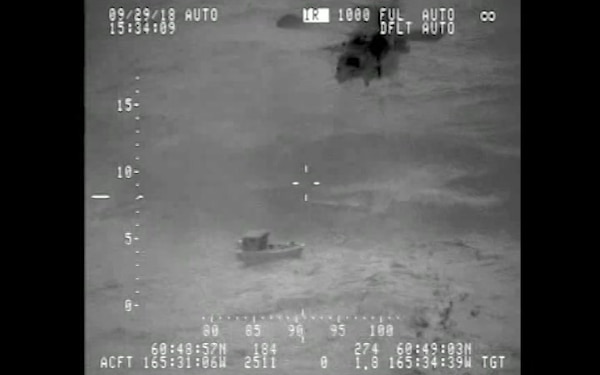Video Release: Coast Guard rescues 5 distressed mariners near Tununak, Alaska
U.S. Coast Guard sent this bulletin at 09/29/2018 04:34 PM EDT
|
Video Release |
U.S. Coast Guard 17th District Alaska |
Coast Guard rescues 5 distressed mariners near Tununak, Alaska
ANCHORAGE, Alaska — The Coast Guard rescued five people stranded on a boat without power off the Alaskan coast near Tununak, Saturday.
A Coast Guard Air Station Kodiak MH-60 Jayhawk helicopter crew hoisted all five people and brought them to Tununak.
Watchstanders in the 17th District command center in Juneau received notification from Alaska State Troopers Friday at about 10:30 p.m. that the 22-foot boat was adrift without power, taking on water and dragging anchor approximately 4 miles off Tununak. The people on the skiff had a VHF radio that was running out of batteries.
The Coast Guard issued an urgent marine information broadcast to alert mariners of the need for help, and diverted the crew of the Coast Guard Cutter Douglas Munro. The Canadian research vessel Frosti answered the UMIB and headed toward the disabled vessel to assist.
An Air Station Kodiak C-130 Hercules aircrew launched and made VHF radio contact with family members of the distressed party near Tununak. The family members guided the pilots to the location of the distressed vessel and got them in radio range of the people aboard.
The Coast Guard Air Station Kodiak helicopter crew launched from Kodiak and arrived on scene at about 7:45 a.m. Saturday before hoisting all five people to the helicopter.
“Because the family of these folks had VHF radios, and because they had a radio aboard as well, we were better able to locate them and understand their situation,” said Lt. Casey Corpe, C-130 Hercules co-pilot for the case. “Though they did not have a life jacket for every person on the boat, I’m sure that next time they go out they will. Alaskan water temperatures are unforgiving. If something goes wrong on the water, a life jacket often means the difference between life and death.”
Conditions when the Coast Guard arrived on scene were 40 mph winds, 6-foot seas, 10-mile visibility, and 49 degree air and water temperatures.
-USCG-


